- Home
- Leslie Meier
Mistletoe Murder Page 17
Mistletoe Murder Read online
Page 17
They rushed from the room, and Lucy watched as they reappeared on the screen. “David Davidson, I am arresting you for the attempted murder of Barney Culpepper. You have the right to remain silent . . .”
Lucy went to the doorway and watched as they led Davidson, handcuffed, down the long hospital corridor. Entering Barney’s room, she saw that Marge had already replaced the plug. She put her arm around her shoulders and stood with her, watching Barney’s chest rise and fall.
“It doesn’t seem to have done him any harm, but I think I’ll call the nurse just to be sure,” said Marge. She had just bent to ring the call button when Barney’s eyes flew open. She jumped back in shock.
“What’s going on here?” Barney demanded.
CHAPTER TWENTY-EIGHT
#3076 Surprise mugs. These white stoneware mugs have a surprise on the bottom for good little boys and girls who finish their cocoa. Specify frog or kitten. $6.50.
“Of course they were having an affair,” said Emily Miller, her white head bobbing and her blue eyes twinkling over her tea cup.
Her ancient friend, Miss Tilley, nodded. “I said so all along, if you remember.”
“It was certainly a surprise to me,” Lucy confessed.
Once again she was having tea with the two old friends, and this time she was dressed for the occasion. She was wearing a brand-new blouse and sweater she’d bought at the Country Cousins January overstock sale. Her ankles were clamped together neatly, a linen napkin was perched on her knees, and she was using her very best manners. In fact, she felt rather like a child at an adult party, a sensation she was doing her best to overcome.
“No, I didn’t know, and I don’t think most other people did, either. I was sure George Higham did it,” she admitted, taking a sip of tea and nearly choking on its odd, smoky flavor.
“It’s Lapsang souchong, dear. Perhaps you’d like something milder?” inquired Miss Tilley.
“Oh, no, this is fine. In fact, I rather like it,” Lucy insisted bravely.
The two old women exchanged a glance.
“I’ve always thought you had possibilities, Lucy Stone. You always chose such eclectic reading material,” remembered Miss Tilley. “Now, do tell us all about that dreadful afternoon.” She settled back in her chair and took a sip of tea, rolling it over her tongue and savoring it.
“I’d taken Marge to the hospital to visit Barney,” Lucy began. “She told me that Dave Davidson was encouraging her to pull the plug on Barney. He kept telling her that Barney would never recover, and that the kindest thing to do would be to end it. It made me suspicious because the nurses told me Barney was getting better.”
“How is he doing, Lucy?” asked Mrs. Miller.
“He’s doing wonderfully. Every day he’s stronger and remembers more. I will never forget how he came out of that coma. One minute he was unconscious, and the next he was wide awake, demanding to know what was going on. It was amazing.”
“Of course, if the Reverend Mr. Davidson had had his way, it would have been very different,” Miss Tilley added tartly. “Such a wicked man.”
“I always tried to avoid him after church,” confessed Lucy. “I never liked him. He made me uneasy. Of course, I never thought he was a murderer until I saw the sculpture.”
“Carol’s sculpture? That did surprise me,” said Miss Tilley.
“The sculpture? I never did like her work, either,” observed Lucy.
“No, no, dear. Not the sculpture. So original. No, the way she hanged herself. I would have expected her to react differently. I rather liked her, you see. She didn’t behave the way a minister’s wife is supposed to. She never went to church; she had a career of her own. I admired that. I was very disappointed to hear she’d killed herself.”
“True grit,” commented Mrs. Miller. “She didn’t have it.”
Mrs. Miller certainly had grit, thought Lucy. She would never let anyone see her grieve for her son.
Grief, like love, was private.
“Well, it must have been pretty devastating,” said Lucy. “First her husband had an affair with Marcia; that would be awful for any woman. And then she figured out he’d murdered Sam, and almost murdered Barney. It would be pretty hard to take, especially if she loved him.”
“Young people are so romantic,” Mrs. Miller said.
“I wouldn’t call this romantic,” said Miss Tilley. “Not in the true sense of the word. I would call it maudlin.”
The other women nodded automatically. After fortyyears as a librarian no one argued with her about facts. Or definitions.
“What about the sculpture? How did it make you realize Davidson was the murderer?” asked Miss Tilley.
“The black hose. Carol had wrapped it all around the sculpture. It was the same hose Dave used on Sam’s car.” Lucy dropped her voice. She hated talking about Sam with his mother.
“A public declaration of his guilt?” Mrs. Miller asked a little shakily. Lucy was reminded again that this must still be hard on her.
“I think so,” she said. “Barney had stumbled on the hose when he mentioned to Carol that he needed something for Eddie’s car. The Cub Scouts are having the Pinewood Derby this month—you know, they race little wooden cars that they make themselves. Well, Barney was looking for some scraps of rubber to make a bumper for Eddie’s car. Knowing Carol was a sculptor and apt to have bits and pieces around, he asked her if she had something he could use. When she gave him a bit of black rubber hose, he recognized it as the same hose that was used on Sam Miller’s car. Barney was going to take it to the police lab the day after Christmas, but he never made it. Dave must have realized Barney had the evidence that could convict him, and decided he had to get rid of him. He parked out near the point, and when Barney came round the bend he turned on his high beams. Barney swerved right off the road.”
The two women clicked their tongues. “I wonder how many of the Ten Commandments he actually broke,” Miss Tilley mused. “Definitely the seventh, and the sixth, of course.”
“He was covetous, and he lied,” Lucy added.
“And Marcia certainly became more important than God to him. She had that effect on a lot of men, including Sam, I’m sorry to say.” Mrs. Miller helped herself to another piece of banana bread.
“He did remember the Sabbath,” said Miss Tilley, determined to be fair. “And I must say I never heard him swear. That’s more than many Christians can claim.”
Lucy and Mrs. Miller chuckled.
“I don’t know what he can expect in the next life, but I hope he will be punished in this life.” Mrs. Miller smoothed the napkin in her lap.
“Oh, yes. Detective Horowitz told me they have an airtight case. Carol left a detailed suicide note, and of course they videotaped him trying to convince Marge to pull the plug.”
“And you saw the police arrest him?” asked Miss Tilley.
“How did he react? When he knew the game was up?” Mrs. Miller sounded serious.
“He seemed angry,” Lucy reported. “He didn’t say anything, but he looked furious.”
“I hope he’s punished,” said Mrs. Miller. “I hope he doesn’t get off on some sort of technicality.”
“I don’t think he will,” said Lucy. “What about Marcia? And your grandson? Will they come back?”
“I don’t think so. She’s living in Paris. She writes to me, you know. I think Tinker’s Cove was a bit tame for her. I may visit them this summer.”
Lucy smiled at her. The resilience of this old woman amazed her. She reached for a piece of banana bread, chewed it thoughtfully, and, sipping her tea, she observed the two old women. Miss Tilley with her large, strong features covered with a tough netting of wrinkles, her long white hair drawn up in a bun; and Mrs. Miller, with a round face just like a dried apple-head doll and her carefully curled and blued hair. In the life of Tinker’s Cove they were forces to be reckoned with. As ardent conservationists they had been instrumental in creating the Tinker’s Cove Conservation Trust. Miss Tilley h
ad spearheaded the local literacy program, and she was a frequent contributor to the letters column in the Pennysaver. Together the two women acted as a collective conscience for the town. They were vital, strong women who were interested in the world around them.
Lucy thought of funerals she had attended where all the women of her generation were in tears, their faces bleak and uncomprehending, their knuckles white as they clutched crumpled tissues. Death was unbelievable to them, an assault on everything they worked so hard to maintain.
The older women, Lucy had noticed, never seemed as distressed. They rarely cried but sat silently through the service, gathering in small groups afterward to comfort each other. When it was time to speak with the bereaved they knew what to say, while Lucy and her friends could only babble clichés such as “Call me if there’s anything I can do.”
She had always admired the acceptance and assurance of these women; she had hoped that in time she would grow to be like them.
She thought of her mother. Her mother had never accepted death the way these women did. Although she was in her sixties, the death of her husband had left her as raw and hurt as if she were a young bride. Her mother had never developed the self-protective detachment so many older women grew.
Lucy wondered what life held for her and how she would cope. Would she maintain her naivete and her vulnerability, as her mother had, or would she turn into someone as wise but as cynical as Miss Tilley?
“We’ve been keeping an eye on you, Lucy.” Miss Tilley interrupted her thoughts.
“Yes, you seem . . . well, interesting,” agreed Mrs. Miller. “You’re not afraid to get involved.”
“My husband wouldn’t agree with you,” observed Lucy. “He’s always telling me to mind my own business.”
“Oh, husbands,” Miss Tilley said dismissively.
“I’m afraid I’d better be getting back to mine. He’s watching the kids today.” She stood up reluctantly and said her good-byes. But as she drove home she kept thinking of the two old women.
Pulling into the driveway, Lucy was surprised not to see any sign of the kids. Maybe Bill had gotten a video for them, but she thought they really ought to be outside on such a nice day. As she opened the front door, she didn’t hear the TV, and she was surprised when Bill met her in the kitchen.
“Where are the kids?” she asked him.
“Your friend Sue took them over to the new playground in Gardner.”
“She did? Why’d she do that?”
“Well, she’s your best friend, and she thought you might enjoy a little time alone with your husband.”
“I don’t suppose you had anything to do with that,” Lucy said, smiling.
“I might have,” said Bill, slipping his arms around her waist.
Lucy raised her face to his and was rewarded with a long, loving kiss.
“Oh, Bill,” said Lucy. “If I let you have your way with me, will you respect me afterwards?”
“I hope not,” said Bill, leading her upstairs.
Please turn the page
for an exciting sneak peek at
Leslie Meier’s
VALENTINE MURDER
Once upon a time there was a poor kitchen maid named Cinderella . . .
On the day she died, Bitsy Howell didn’t want to get out of bed. Her bedroom was cold, for one thing. It was always cold, thanks to her landlady, Mrs. Withers, who turned the heat down to fifty-five degrees every night to save money on heating oil. It didn’t matter one bit to Mrs. Withers that it was the coldest winter in twenty years.
And if the cold bedroom wasn’t reason enough to stay in bed, well, the fact that it was Thursday made getting up especially difficult. Bitsy hated Thursdays.
Thursday was story hour day at the Broadbrooks Free Library where she was the librarian. Just thinking about story hour depressed Bitsy. She found it practically impossible to keep ten or fifteen pre-school children focused on a storybook. Thanks to TV and video games, they had no attention span whatsoever. They fidgeted and wriggled in their seats, they picked their noses, they did everything except what Bitsy wanted them to do which was to sit quietly and listen to a nice story followed by a finger-play or song, or maybe a simple craft project.
This Thursday, however, happened to be the last Thursday in January. That meant the library’s board of directors would meet, as they did on the third Thursday of every month. Bitsy would not only have to cope with story hour, but with the directors, too.
Bitsy had come to the tiny Broadbrooks Free Library in Tinker’s Cove, Maine, from a big city library. One factor in her decision to leave had been her poor relationship with her boss, the head librarian. Little had she known that she was swapping one rather difficult menopausal supervisor for seven meddlesome and inquisitive directors.
Bitsy sighed and heaved herself out of bed. She padded barefoot around her rather messy bedroom, looking for her slippers. She found one underneath a magazine and the other tangled in a pair of sweat pants. One of these days, she promised herself, she would get organized and pick up the clothes that were strewn on the floor. Not today, of course. She didn’t have time today.
On her way to the bathroom she raised the shade and peered out the window, blinking at the bright winter sunlight. Shit, she muttered. It had snowed again.
Arriving at the library, Bitsy studied the new addition which contained a children’s room, workroom, and conference room. It was undeniably handsome, and badly needed, but it had been a dreadful bone of contention.
When she had first come to Tinker’s Cove the library was a charming but antiquated old building that was far too small for the needs of the community. Getting the board to agree to build the addition, and then raising the money for it had been a struggle, one Bitsy wouldn’t want to repeat. Now, if she could only get them to take the next step and buy some computers so the library could go on-line.
“Tiny baby steps,” she muttered as she unlocked the door. Flicking on the lights as she went, Bitsy headed for her office. She had an hour or so before the library opened and she wanted to have her facts and figures straight before the board meeting.
Pushing aside a few of the papers that cluttered her desk, she set down a bag containing a Styrofoam cup of coffee, with cream and sugar, and a couple of sugary jelly doughnuts. She draped her coat over an extra chair and took her seat, flicking on the computer. Soon she was happily immersed in numbers and percentages, all the while slurping down her coffee and scattering powdered sugar all over her desk.
At ten minutes past ten she heard someone banging at the main entrance and realized she hadn’t unlocked the doors.
“I’m so sorry,” she apologized as she pulled open the heavy oak door. “I lost track of the time.”
“No problem, my dear,” said Gerald Asquith, smiling down at her benignly. Tall and gray-haired, dressed in a beautifully tailored cashmere overcoat, he was the retired president of Winchester College and one of the members of the board of directors. “I know I’m a bit early, but I want to go over the final figures for the addition before the meeting.”
“Of course,” said Bitsy. “I’ll get the file for you.”
Bitsy had hoped Gerald would seat himself at the big table in the reference room, but instead he hung his coat up on the rack by the door and followed her into her office. When she gave him the file he sat down at her desk, displacing her, and began studying it.
Bitsy gave a little shrug and headed for the children’s section. She had to come up with something for story hour anyway; it was in less than hour, at eleven.
She was leafing through a lavishly illustrated edition of Cinderella when she felt a presence behind her. Turning, she greeted Corney Clarke with a polite smile. Corney, an attractive blonde of indeterminate age, ran a busy catering service and called herself a “lifestyle consultant.” She was also a member of the board of directors.
“Can I help you?” asked Bitsy, mindful of her status as an employee.
“No. I came a little
early to see the new addition. It’s a big improvement, isn’t it?” said Corney, walking around the sunny area, admiring the low bookshelves and child-sized seating.
“It sure is,” agreed Bitsy. “We must have been the only library in the state without a children’s room.”
“It must be fun doing story hour, now, in such nice surroundings,” surmised Corney.
“Oh, yes,” said Bitsy, attempting to sound enthusiastic. “Today we’re reading Cinderella.”
“Oh.” Corney wrinkled her forehead in concern. “I don’t want to tell you how to do your job, but are you sure that’s a good choice?”
“The children like it . . .” began Bitsy.
“Well, of course they do. But does it send the right message?”
“It’s just a fairy tale.” Bitsy bit her lip. Personally, she didn’t think every story had to have a socially redeeming message, and she wasn’t sure Corney was the right person to decide what was suitable for young children, either. After all, she was childless and never married, though not from lack of effort.
“Well, we don’t want our little girls growing up and thinking life is a fairy tale, do we? We don’t want them to wait for Prince Charming to rescue them from the kitchen—we want them to become self-actualizing, don’t we?” Corney gave Bitsy an encouraging smile, and patted her hand. “I’m sure you can find something more suitable.” She paused for a moment and came up with a suggestion. “Like The Little Engine that Could, ”she said, turning and striding off in the direction of the office.
Bitsy rolled her eyes and replaced Cinderella on the shelf. Pulling out one volume after another, she dismissed them. Children’s literature was so insipid these days. Everything had to have a positive, meaningful message. She wanted something with a little bite. Something exciting. She opened a battered copy of Hansel and Gretel and began turning the pages. This ought to keep the little demons’ attention, she thought, admiring a lurid illustration of the tiny Hansel and Gretel cringing in terror as the grinning witch opened the oven door.

 Christmas Card Murder
Christmas Card Murder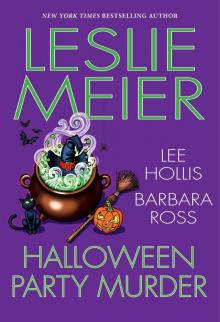 Halloween Party Murder
Halloween Party Murder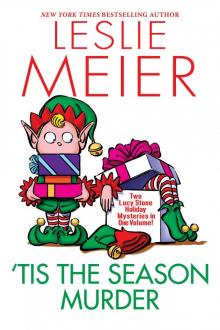 'Tis the Season Murder
'Tis the Season Murder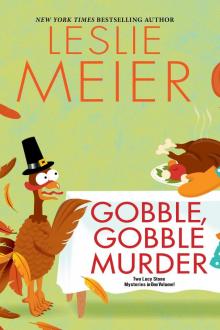 Gobble, Gobble Murder
Gobble, Gobble Murder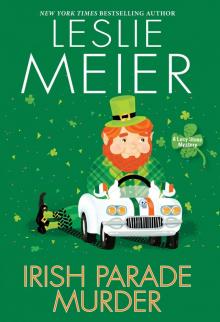 Irish Parade Murder
Irish Parade Murder Bake Sale Murder
Bake Sale Murder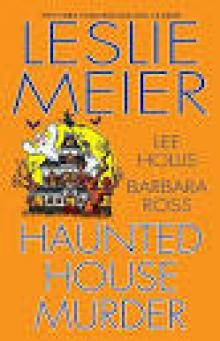 Haunted House Murder
Haunted House Murder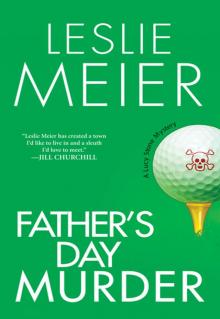 Father’s Day Murder
Father’s Day Murder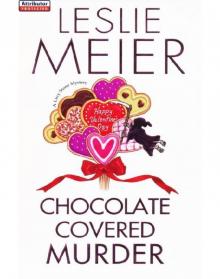 Chocolate Covered Murder
Chocolate Covered Murder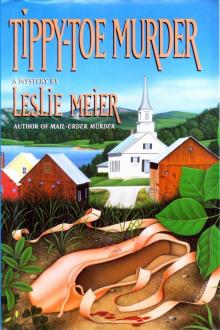 Tippy Toe Murder
Tippy Toe Murder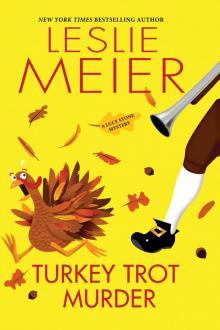 Turkey Trot Murder
Turkey Trot Murder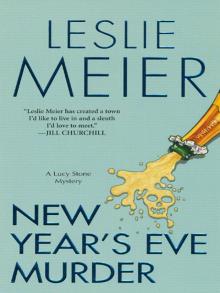 New Year's Eve Murder
New Year's Eve Murder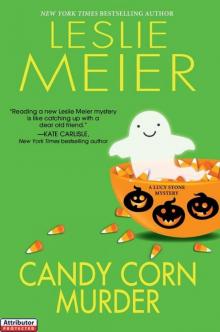 Candy Corn Murder
Candy Corn Murder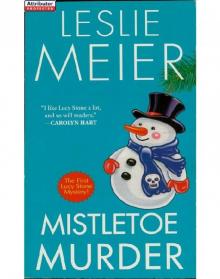 Mistletoe Murder
Mistletoe Murder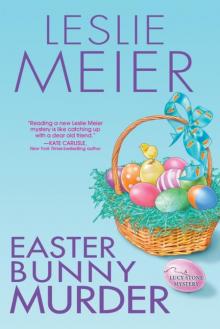 LStone 20 - Easter Bunny Murder
LStone 20 - Easter Bunny Murder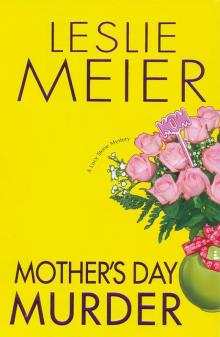 Mother's Day Murder
Mother's Day Murder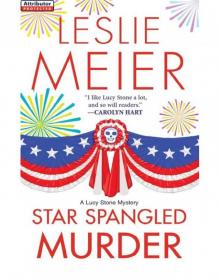 Star Spangled Murder
Star Spangled Murder Silver Anniversary Murder
Silver Anniversary Murder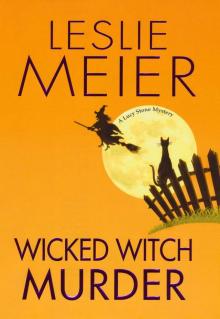 Wicked Witch Murder
Wicked Witch Murder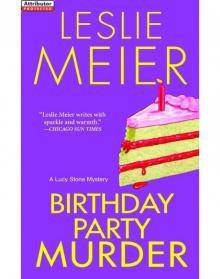 Birthday Party Murder
Birthday Party Murder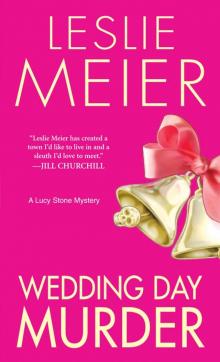 Wedding Day Murder
Wedding Day Murder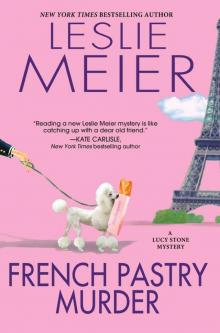 French Pastry Murder
French Pastry Murder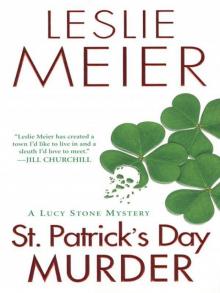 St. Patrick's Day Murder
St. Patrick's Day Murder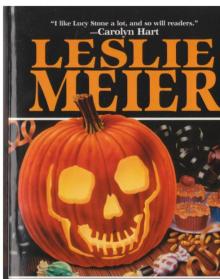 Trick or Treat Murder
Trick or Treat Murder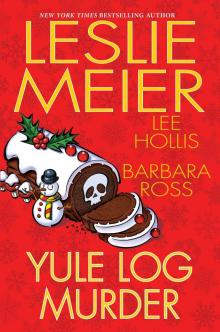 Yule Log Murder
Yule Log Murder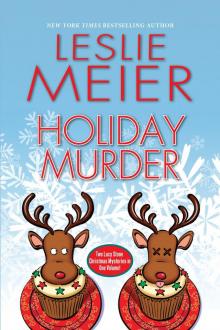 Holiday Murder
Holiday Murder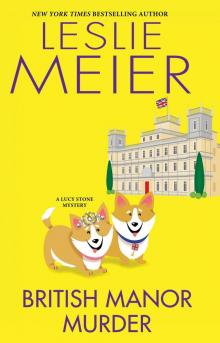 British Manor Murder
British Manor Murder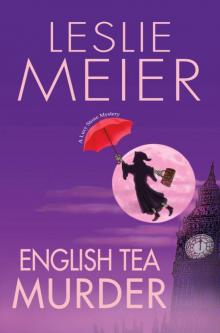 English Tea Murder
English Tea Murder